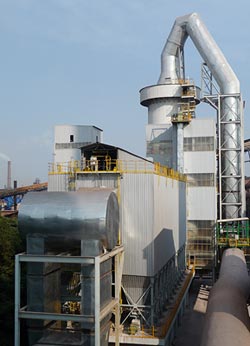Kardemir to clean sinter off-gases with Meros technology from Siemens

Siemens Meros plant for cleaning sinter off-gas
Siemens Metals Technologies has received an order from Karabük Demir Celik Sanayi ve Ticaret A.S. (Kardemir), a Turkish steel producer, to supply key components to clean the off-gases from its new sinter plant No. 3.
The order comprises the engineering for the entire off-gas cleaning system and supply of the first and final cleaning stages, the latter being based on Meros technology. The purpose of the project is to drastically reduce dust and sulfur emissions. The system will be able to clean some 400,000 standard cubic meters of off-gas per hour, and is scheduled to come into operation at the end of 2014.
Kardemir is currently implementing a comprehensive expansion program at its Karabük production location, which also includes the construction of the new sinter plant No. 3. In 2012, Siemens had previously supplied this Turkish manufacturer of long products with a Merim dry dedusting system for a new blast furnace, which will shortly be brought into operation. Kardemir chose Siemens once again for the off-gas cleaning concept for its forthcoming sinter plant No. 3, which will reduce emissions to a value significantly below the statutory limit.
Siemens will handle the basic engineering of the entire plant as well as the detail engineering and supply of key components for the first and final cleaning stages. In the first stage, a cyclone separator will remove the coarse dust from the off-gas flow. The separated coarse dust will be completely recycled back into the sinter production to minimize the loss of iron. The second and final cleaning stage will work with the Meros process developed by Siemens. This involves injecting and evenly distributing adsorption and desulfurizing agents into the off-gas flow. Kardemir will use hydrated lime as an additive for desulfuization. This will enable the sulfur dioxide content of the off-gas to be reduced by over 85 percent. The system will be designed so that it can be later extended during operation with additional features so that also nitrogen oxides, dioxins and volatile organic compounds can be removed.
Further information about solutions for steel works, rolling mills and processing lines is available at: www.siemens.com/metals
Meros is a registered trademark of Siemens AG and/or one of its subsidiaries in some countries.
The Siemens Industry Sector (Erlangen, Germany) is the world's leading supplier of innovative and environmentally friendly products and solutions for industrial customers. With end-to-end automation technology and industrial software, solid vertical-market expertise, and technology-based services, the Sector enhances its customers' productivity, efficiency, and flexibility. With a global workforce of more than 100,000 employees, the Industry Sector comprises the Divisions Industry Automation, Drive Technologies and Customer Services as well as the Business Unit Metals Technologies. For more information, visit http://www.siemens.com/industry
The Metals Technologies Business Unit (Linz, Austria), part of the Siemens Industry Sector, is one of the world's leading life-cycle partners for the metals industry. The Business Unit offers a comprehensive technology, modernization, product and service portfolio as well as integrated automation and environmental solutions covering the entire life cycle of plants. For more information, visit http://www.siemens.com/metals
Reference Number: IMT201401558e
Contact
Mr. Rainer Schulze
Metals Technologies
Siemens AG
Turmstr. 44
4031 Linz
Austria
Tel: +49 (9131) 7-44544
rainer.schulze@siemens.com
Media Contact
More Information:
http://www.siemens.com/metalsAll latest news from the category: Corporate News
Newest articles

Security vulnerability in browser interface
… allows computer access via graphics card. Researchers at Graz University of Technology were successful with three different side-channel attacks on graphics cards via the WebGPU browser interface. The attacks…

A closer look at mechanochemistry
Ferdi Schüth and his team at the Max Planck Institut für Kohlenforschung in Mülheim/Germany have been studying the phenomena of mechanochemistry for several years. But what actually happens at the…

Severe Vulnerabilities Discovered in Software to Protect Internet Routing
A research team from the National Research Center for Applied Cybersecurity ATHENE led by Prof. Dr. Haya Schulmann has uncovered 18 vulnerabilities in crucial software components of Resource Public Key…





















